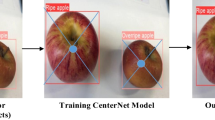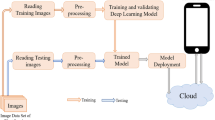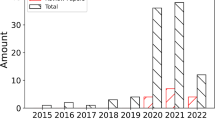Abstract
Vegetable diseases and pests continue to be a major threat to food security. Manual identification is time-consuming and labor-intensive due to the wide variety of diseases and pests, and it is also prone to errors. In this paper, a novel and integrated deep learning framework based on convolutional neural networks was proposed for leek disease identification using an improved Cycle-GAN network, gated recurrent units, and recurrent convolutional auto-encoders. We collected healthy and diseased leek leaves under realistic conditions for the experimental implementation. We concentrated on the identification of five leek diseases: virus, rust, blight, sclerotium rolfsii, and botrytis cinerea. It is discovered that the proposed method’s evaluation metrics produce an accuracy of 99.58%, a specificity of 99.62%, a sensitivity of 97.96%, a precision of 99.77%, and an f1-score of 98.19%, which is significantly higher than other cutting-edge deep learning models such as ShuffleNet-V3, Inception-V4, and Efficient-B7. Many aspects of the proposed model implementation provide competitive advantages, such as high recognition precision, strong adaptive ability, and good generalization. In conclusion, the proposed system can accurately classify leek diseases, which is very beneficial in increasing the efficiency of plant pathology image analysis.










Similar content being viewed by others
Data availability
Data sharing not applicable to this article as no datasets were generated or analyzed during the current study.
Abbreviations
- CNN:
-
Convolutional Neural Network
- Cycle-GAN:
-
Cycle Generative Adversarial Network
- R-CAE:
-
Recurrent Convolutional Auto-Encoders
- GRU:
-
Gated Recurrent Unit
- SVM:
-
Support Vector Machine
- PCA:
-
Principal Component Analysis
- KNN:
-
K-nearest Neighbor
- DCC:
-
Deep Continuous Clustering
- BN:
-
Batch Normalization
- GNN:
-
Graph Neural Networks
- CoGAN:
-
Coupled Generative Adversarial Network
- ProGAN:
-
Progressive Generative Adversarial Network
- SAGAN:
-
Self-Attention Generative Adversarial Network
- \({D}_{X}\) :
-
It is the discriminator in the X-domain
- \({D}_{Y}\) :
-
It is the discriminator in the Y-domain
- F :
-
It is the generator in the X-domain
- G :
-
It is the generator in the Y-domain
- \(\Omega\) :
-
It is the mapping space of X → Y
- M :
-
It is the mapping space of Y → Z
- Z :
-
It is the set of several clusters
References
Abbas S, Khan MA, Alhaisoni M, Tariq U, Armghan A, Alenezi F, Majumdar A, Thinnukool O (2023) Crops leaf diseases recognition: a framework of optimum deep learning features. CMC-Comp Mater Cont 74(1):1139–1159. https://doi.org/10.32604/cmc.2023.028824
Abed Sudad H, Al-Waisy Alaa S, Mohammed Hussam J, Al-Fahdawi S (2021) A modern deep learning framework in robot vision for automated bean leaves diseases detection. Int J Intel Rob Appl 5(2):235–251. https://doi.org/10.1007/s41315-021-00174-3
Beheshtipour B, Papa MA (2021) Deep learning for clustering of continuous gravitational wave candidates II Identification of low-SNR candidates. Phys Rev D 103(6):1–10. https://doi.org/10.1103/PHYSREVD.103.064027
Dar JA, Srivastava KK, Lone SA (2022a) Spectral features and optimal Hierarchical attention networks for pulmonary abnormality detection from the respiratory sound signals. Biomed Sin Proce Control 78:1–25. https://doi.org/10.1016/j.bspc.2022.103905
Dar JA, Srivastava KK, Lone SA (2022b) Fr-WCSO-DRN: fractional water cycle swarm optimizer-based deep residual network for pulmonary abnormality detection from respiratory sound signals. SN Comp Sci 3:1–21. https://doi.org/10.1007/s42979-022-01264-0
Dar JA, Srivastava KK, Lone SA (2022c) Design and development of hybrid optimization enabled deep learning model for COVID-19 detection with comparative analysis with DCNN. BIAT-GRU XGBoost Comp Biol Med 150:1–16. https://doi.org/10.1016/j.compbiomed.2022.106123
Devisurya V, Devi PR, Anitha N (2022) Early detection of major diseases in turmeric plant using improved deep learning algorithm. Bull Polish Acad Sci Tech Sci 70(2):1–10. https://doi.org/10.24425/bpasts.2022.140689
Dong S, Wang P, Abbas K (2021) A survey on deep learning and its applications. Comp Sci Rev 40:1–22. https://doi.org/10.1016/j.cosrev.2021.100379
Goel L, Nagpal J (2022) A Systematic review of recent machine learning techniques for plant disease identification and classification. IETE Tech Rev. https://doi.org/10.1080/02564602.2022.2121772
Herath H, Mittal M (2022) Adoption of artificial intelligence in smart cities: A comprehensive review. Int J Inform Manag Data Insights 10076:1–21. https://doi.org/10.1016/j.jjimei.2022.100076
Hosny KM, El-Hady WM, Samy FM, Vrochidou E, Papakostas GA (2023) Multi-Class classification of plant leaf diseases using feature fusion of deep convolutional neural network and local binary pattern. IEEE Access 11:62307–62317. https://doi.org/10.1109/ACCESS.2023.3286730
Hu GW, Zheng YF, Yan HR, Hua G, Yan YC (2022) Mask-guided cycle-GAN for specular highlight removal. Patt Recog Lett 161:108–114. https://doi.org/10.1016/j.patrec.2022.06.014
Huang XB, Chen AB, Zhou GX, Zhang X, Wang JW, Peng N, Yan N, Jiang CH (2022) Tomato leaf disease detection system based on FC-SNDPN. Multimed Tools Appl 82:2121–2144. https://doi.org/10.1007/s11042-021-11790-3
Indu VT, Priyadharsini SS (2022) Crossover-based wind-driven optimized convolutional neural network model for tomato leaf disease classification. J Plant Dis Prot 129(3):559–578. https://doi.org/10.1007/s41348-021-00528-w
Jiang QH, Zhu L, Shu C, Sekar V (2022) Multilayer perceptron neural network activated by adaptive Gaussian radial basis function and its application to predict lid-driven cavity flow. Acta Mech Sin 37(12):1757–1772. https://doi.org/10.1007/s10409-021-01144-5
Kainat J, Ullah S, Alharithi F, Alvarez-Preciado LG, Rodriguez-Vazquez AG, Lara-Avila JP (2021) Blended features classification of leaf-based cucumber disease using image processing techniques. Compl. https://doi.org/10.1155/2021/9736179
Korchagin SA, Gataullin ST, Osipov AV, Smirnov MV, Suvorov SV, Serdechnyi DV, Bublikov KV (2021) Development of an optimal algorithm for detecting damaged and diseased potato tubers moving along a conveyor belt using computer vision systems. Agronomy-Basel 11(10):1–18. https://doi.org/10.3390/agronomy11101980
Kujawa S, Niedbala G (2021) Artificial neural networks in agriculture. Agri-Basel 11(6):1–6. https://doi.org/10.3390/agriculture11060497
Li XH, Du ZS, Huang YY, Tan ZY (2021) A deep translation (GAN) based change detection network for optical and SAR remote sensing images. ISPRS J Photog Remote Sens 179:14–34. https://doi.org/10.1016/j.isprsjprs.2021.07.007
Li DW, Ahmed F, Wu NL, Sethi AI (2022a) YOLO-JD: A deep learning network for jute diseases and pests detection from images. Plants-Basel 11(7):1–13. https://doi.org/10.3390/plants11070937
Li K, Ni TG, Xue J, Jiang YZ (2022b) Deep soft clustering: simultaneous deep embedding and soft-partition clustering. J Amb Intell Human Comp. https://doi.org/10.1007/s12652-021-02997-1
Liu XJ, Zhou SB, Chen SX, Yi ZL, Pan HY, Yao R (2022a) Buckwheat disease recognition based on convolution neural network. Appl Sci-Basel 12(9):1–22. https://doi.org/10.3390/app12094795
Liu YW, Zhang X, Gao YX, Qu TG, Shi YQ (2022b) Improved CNN method for crop pest identification based on transfer learning. Comp Intell Neurosci. https://doi.org/10.1155/2022/9709648
Loti NNA, Noor MRM, Chang SW (2021) Integrated analysis of machine learning and deep learning in chili pest and disease identification. J Sci Food Agri 101(9):3582–3594. https://doi.org/10.1002/jsfa.1098
Luo JH, Tian YX, Yu H, Chen Y, Wu M (2022) Semi-supervised cross-subject emotion recognition based on stacked denoising autoencoder architecture using a fusion of multi physiological signals. Entropy 24(5):1–29. https://doi.org/10.3390/e24050577
Mao S, Sejdic E (2022) A review of recurrent neural network-based methods in computational physiology. IEEE Trans Neural Net Learn Syst. https://doi.org/10.1109/TNNLS.2022.3145365
Math RM, Dharwadkar NV (2022) Early detection and identification of grape diseases using convolutional neural networks. J Plant Dis Protect 129(3):521–532. https://doi.org/10.1007/s41348-022-00589-5
Naik B, Malmathanraj R, Palanisamy P (2022) Detection and classification of chilli leaf disease using a squeeze-and-excitation-based CNN model. Ecol Inform 69:1–10. https://doi.org/10.1016/j.ecoinf.2022.101663
Narayanan KL, Krishnan RS, Robinson YH, Julie EG, Vimal S, Saravanan V, Kaliappan M (2022) Banana plant disease classification using hybrid convolutional neural network. Comp Intell Neurosci. https://doi.org/10.1155/2022/9153699
Nirmal M, Pramod J, Santosh P, (2022). Pomegranate Leaf Disease Classification using Feature Extraction and Machine Learning, 3rd International Conference on Smart Electronics and Communication (ICOSEC):619–626. Doi: https://doi.org/10.1109/ICOSEC54921.2022.9951907
Omana SP, Dar JA, Kumar TR, Sampath AK (2022) Henry gas bird swarm optimization algorithm-based deep learning for brain tumor classification using magnetic resonance imaging. Concurr Comput Pract Exper. https://doi.org/10.1002/cpe.7541
Pal A, Singh K (2022) R-GRU: Regularized gated recurrent unit for handwritten mathematical expression recognition. Multi Tools Appl 81(22):31405–31419. https://doi.org/10.1007/s11042-022-12889-x
Rimal K, Shah K, Jha A (2022) Advanced multi-class deep learning convolution neural network approach for insect pest classification using TensorFlow. Int J Environ Sci Technol. https://doi.org/10.1007/s13762-022-04277-7
Rizvi SZM, Reynolds OL, Haque A, Furlong MJ, Mo JH, Melo MC, Akter S, Sandoval-Gomez VE, Johnson AC, Gurr GM (2022) Prospects for habitat management to suppress vegetable pests in Australia. Austral Entomol 61(1):3–28. https://doi.org/10.1111/aen.12588
Saleem MH, Potgieter J, Arif KM (2022) Automation in agriculture by machine and deep learning techniques: a review of recent developments. Preci Agri 22(6):2053–2091. https://doi.org/10.1007/s11119-021-09806-x
Shen F, Deng H, Yu L, Cai F (2022) Open-source mobile multispectral imaging system and its applications in biological sample sensing. Spectrochimica Acta Part A-Molecular and Biomolecular Spectroscopy. https://doi.org/10.1016/j.saa.2022.121504
Sindhu P, Indirani G (2022) Internet of things enabled pomegranate leaf disease detection and classification using cuckoo search with sparse auto encoder. Mathemat Stat Eng Appl 71(3):904–917. https://doi.org/10.17762/msea.v71i3.252
Terentev A, Dolzhenko V, Fedotov A, Eremenko D (2022) Current state of hyperspectral remote sensing for early plant disease detection: a review. Sensors 22(3):1–31. https://doi.org/10.3390/s22030757
Thenmozhi S, Lakshmi RJ, Kumudavalli MV, Ibrahim I, Mohan R (2021) A novel plant leaf ailment recognition method using image processing algorithms. J Sci Indus Res 80(11):979–984
Vallejo-Perez MR, Sosa-Herrera JA, Navarro-Contreras HR, Alvarez-Preciado LG, Rodriguez AG, Lara-Avila JP (2021) Raman spectroscopy and machine learning for early detection of bacterial canker of tomato: the asymptomatic disease condition. Plants-Basel 10(8):1–17. https://doi.org/10.3390/plants10081542
Vasantha S, Samreen S, Aparna Y (2022) Rice disease diagnosis system (RDDS). CMC-Comp Mater Cont 73(1):1895–1914. https://doi.org/10.32604/cmc.2022.028504
Waheed H, Zafar N, Akram W, Manzoor A, Gani A, Islam S (2022) Deep learning based disease, pest pattern and nutritional deficiency detection system for “Zingiberaceae” crop. Agri-Basel 12(6):1–17. https://doi.org/10.3390/agriculture12060742
Wakhare P, Kandalkar J, Kawtikwar R, Kalme S, Patil R (2023) Development of automated leaf disease detection in pomegranate using alexnet algorithm. Current Agri Res J 11(1):1–9. https://doi.org/10.12944/CARJ.11.1.15
Wang DY, Vinson R, Holmes M, Seibel G, Bechar A, Nof S, Tao Y (2019) Early detection of tomato spotted wilt virus by hyperspectral imaging and outlier removal auxiliary classifier generative adversarial nets (OR-AC-GAN). Sci Rep 9:1–14. https://doi.org/10.1038/s41598-019-40066-y
Wang XW, Liu J, Zhu XN (2021a) Early real-time detection algorithm of tomato diseases and pests in the natural environment. J Intell Fuzzy Syst 17(1):1–17. https://doi.org/10.1186/s13007-021-00745-2
Wang H, Peng MJ, Miao Z, Liu YK, Ayodeji A, Hao CM (2021b) Remaining useful life prediction techniques for electric valves based on convolution auto encoder and long short term memory. ISA Trans 108:333–342. https://doi.org/10.1016/j.isatra.2020.08.031
Wang T, Shen F, Deng H, Cai F, Shen S (2022) Smartphone imaging spectrometer for egg/meat freshness monitoring. Anal Meth 14(5):508–517. https://doi.org/10.1039/d1ay01726h
Wei KH, Chen BJ, Zhang JC, Fan SH, Wu KH, Liu GY, Chen DM (2022) Explainable deep learning study for leaf disease classification. Agronomy-Basel 12(5):1–13. https://doi.org/10.3390/agronomy12051035
Xiao ZT, Yin K, Geng L, Wu J, Zhang F, Liu YB (2022) Pest identification via hyperspectral image and deep learning. Sig Image Video Proce 16(4):1–13. https://doi.org/10.1007/s11760-021-02029-7
Xu C, Ding JQ, Qiao Y, Zhang LX (2022) Tomato disease and pest diagnosis method based on the stacking of prescription data. Comp Elect Agri 197:1–12. https://doi.org/10.1016/j.compag.2022.106997
Yadav A, Thakur U, Saxena R, Pal V, Bhateja V, Lin JCW (2022) AFD-Net: Apple Foliar Disease multi classification using deep learning on plant pathology dataset. Plant Soil 477(1–2):595–611. https://doi.org/10.1007/s11104-022-05407-3
Yeswanth PV, Deivalakshmi S, George S, Ko SB (2023) Residual skip network-based super-resolution for leaf disease detection of grape plant. Circ Syst Sig Proce. https://doi.org/10.1007/s00034-023-02430-2
Zhang Y, Wu HR, Chen C, Wang XM (2021) Rapid recognition of tomato’s Disease stages based on the kernel mutual subspace method. Appl Eng Agri 37(5):793–804. https://doi.org/10.13031/aea.14507
Zhang Y, Yang GP, Liu YK, Liu YK, Wang C, Yin YL (2022) An improved YOLO network for unopened cotton boll detection in the field. J Intell Fuzzy Syste 42(3):2193–2206. https://doi.org/10.3233/JIFS-211514
Author information
Authors and Affiliations
Corresponding author
Ethics declarations
Conflict of interest
The authors declare that they have no conflicts of interest/competing interests.
Ethical approval and consent to participate
This article does not contain any studies with human participants or animals performed by any of the authors.
Informed consent and Consent for publication
Informed consent was obtained from all individual participants included in the study.
Additional information
Publisher's Note
Springer Nature remains neutral with regard to jurisdictional claims in published maps and institutional affiliations.
Rights and permissions
Springer Nature or its licensor (e.g. a society or other partner) holds exclusive rights to this article under a publishing agreement with the author(s) or other rightsholder(s); author self-archiving of the accepted manuscript version of this article is solely governed by the terms of such publishing agreement and applicable law.
About this article
Cite this article
Xu, L., Ning, S., Zhang, W. et al. Identification of leek diseases based on deep learning algorithms. J Ambient Intell Human Comput 14, 14349–14364 (2023). https://doi.org/10.1007/s12652-023-04674-x
Received:
Accepted:
Published:
Issue Date:
DOI: https://doi.org/10.1007/s12652-023-04674-x




